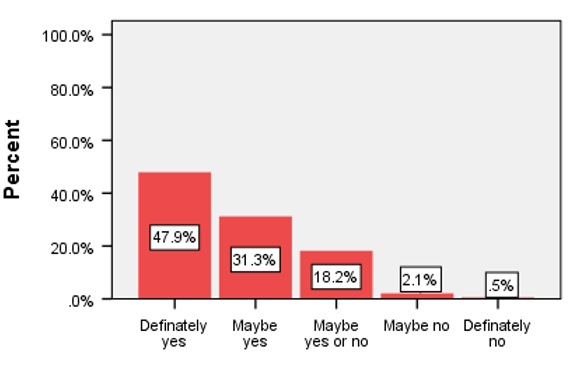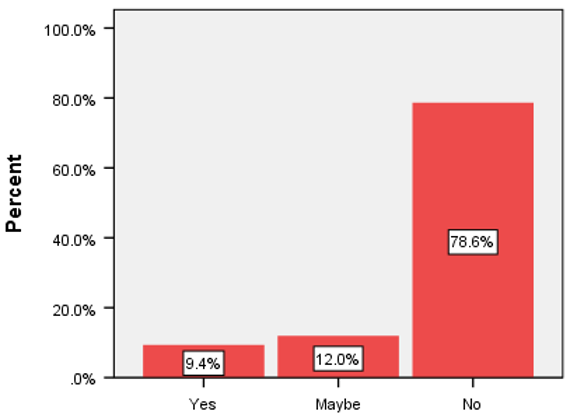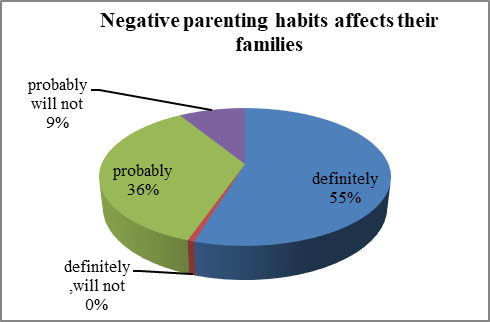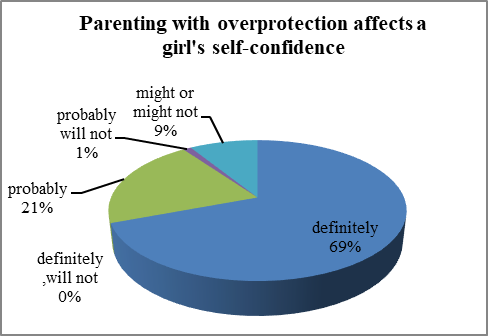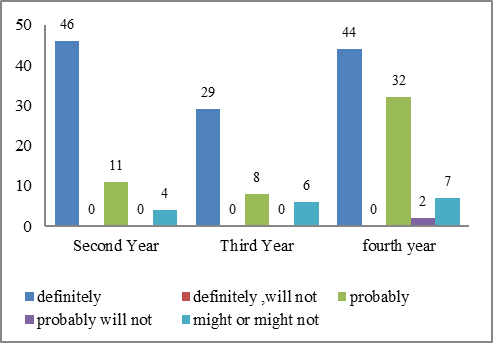Archive \ Volume.15 2024 Issue 1
Influence of Parent's Behavior and Practice on their Family Health
,Abstract
Numerous studies have demonstrated that parental conduct and practices have a direct impact on several elements of family life, including health. The goal of the study is to pinpoint the bad parenting practices that may have an impact on the social and physical development of their families. A pre-tested questionnaire was used to collect data for this descriptive-cross-sectional study, including 192 respondents and examined how parents' behaviors and practices affect the health of their families. Data were interpreted using the statistical package for social sciences, version 26. The results clarified the parents multifaceted impact on the health of their family. Regarding cognitive functioning, 85% of participants indicated that having supportive parents is essential for the growth of social and cognitive well-being in families. About 90% of participants agreed, in terms of conduct, that a parent's behavior can influence their family's behavior. On the social side, 50% of the participants agreed that there is a strong relationship between the absence of a parent and some effects on the social health of their families. The study made clear there is a strong correlation between parents' lack of literacy and their capacity to support their families, demonstrating that most participants believed that the presence of supportive parents is essential for the development of a family's mental and social health. Study suggests that in order to promote families' social and psychological well-being, supportive hospitals and specialized programs should be made available.
How to cite:
Download Citation
INTRODUCTION
Numerous studies have demonstrated that parental conduct and practices have a direct impact on several elements of family life, including health. Specifically, poor parenting practices are linked to children's negative habits. One of the studies has shown that the level of education of the mother may affect her food choices provided to the family, which may make the children follow this pattern of life [1].
All social and psychological problems may be transmitted from one generation to another [2] resulting in (alcoholism, smoking, eating too much harmful foods, etc.) [3].
The psychological aspect is that parents influence children through their problems Also, their behaviors may affect children’s long-term mental health, and as for the social aspect, such as that parents follow customs and traditions, it affects children [4].
Most adults copy the behavior of parents in two ways: consciously on one hand, and subconsciously on the other hand [5].
Studies proved that the refusal of parents to use alcohol strengthens children to do the same later.
Also, the eating behaviors of family members were affected by the behavior of fathers, and this has been proven by a study that has worked to prove the influence of Parents' Eating Behaviors and Child Feeding Practices on Children’s Weight Status and has proven that mothers’ behaviors were quoted by most girls and boys [6].
A study conducted by the Prince's Trust found that 26 percent of young people from low-income families, ages 16 to 24, believed that "people like them don't succeed in life." Parental attitudes are transmitted to their offspring. For instance, a young person's likelihood of desiring to continue their education after the age of sixteen is influenced by their parents' educational experiences and attitudes. According to a recent Department of Education longitudinal study of young people in England (LSYPE) analysis, 90% of 13-year-olds with parents in "higher managerial and professional occupations" intend to finish their education, but just 67% of 13-year-olds with parents in "routine occupations" intend to do so” [7].
Objectives
- To identify parent’s negative behaviors which can have influence their children’s health and social development.
- To clarify parent’s negative attitudes and practices that might affect their family's social and psychological health.
- To raise awareness on the importance of building children’s confidence/personality and best parental practices.
MATERIALS AND METHODS
Study Design
Descriptive-cross sectional to study the influence of parents’ behavior and practices on their family health.
Study Area
Faculty of Public Health and Informatics at Umm Al-Qura University in Makkah
Study Population
50% of female students (192) at the Faculty of Public Health and Informatics.
Methods of Data Collection
Questionnaire
A well-designed, pretested questionnaire that fulfilled the intended objective had been administered to collect the necessary data.
Observation: Observation is used to collect essential data to fulfill research objectives.
Data Analysis
Data was analyzed using the Statistical Package for Social Sciences (SPSS) Version.26
Ethical Clearance
Ethical clearance was obtained from the Committee of Biomedical Research Ethics in the Faculty of Medicine, Umm Al-Qura University.
RESULTS AND DISCUSSION
Statistical Analysis
Software & Statistical Methods
SPSS v26 was used to analyze survey data.
Descriptive Statistics: frequency distribution was analyzed, either in the form of tables (for the sample characteristics) or bar charts (for the main questions).
Chi-square Test: this test tries to see whether two categorical variables are related to each other or not. The test contains a series of mathematical calculations that finally results in a p-value, which ranges between 0 and 1. If the p-value is less than .05, the relationship is significant (it seems to exist). The threshold of .05 is called the level of significance or alpha. Alpha is usually chosen to be .05 in research. It can be smaller (strict test) or larger (lenient test).
Descriptive Statistics
Sample Characteristics
The sample contained 192 female participants who can be categorized according to their major, academic year, and age as shown in the table below:
|
Table 1. Distribution of participants according to age, specialty and academic year |
|||
|
Variable |
Major |
N |
% |
|
Major |
Health Administration |
92 |
48.9 |
|
Health Promotion |
96 |
51.1 |
|
|
Total |
188* |
100.0 |
|
|
Academic Year |
2 |
61 |
32.3 |
|
3 |
43 |
22.8 |
|
|
4 |
85 |
45.0 |
|
|
Total |
189** |
100.0 |
|
|
Age |
18 - 20 |
68 |
35.6 |
|
21 - 22 |
91 |
47.6 |
|
|
23 and above |
32 |
16.8 |
|
|
Total |
191*** |
100.0 |
|
* 4 participants did not provide their majors
** 3 participants did not provide their academic year
*** 1 participant did not provide her age
The sample is roughly divided into those who have a Health Administration A major and those who have a Health Promotion major (48.9% and 51.1% respectively). The largest portion of the sample participants were students in the 4th year (45%), and the rest were in the 2nd and 3rd year (32.3% and 22.8% respectively). The largest proportion of the participants (47.6%) were 21-22 years old. Those who were younger constituted 35.6% of the sample, while those older constituted 16.8%.
Further, the tables below show the distribution of participants by (1) academic year at each age group, (2) major at each age group, and (3) major at each academic year:
|
Table 2. Age academic year relations |
|||||
|
Age * Academic Year Crosstabulation |
|||||
|
|
Academic Year |
Total |
|||
|
2 |
3 |
4 |
|||
|
Age |
18 - 20 |
53 |
13 |
2 |
68 |
|
21 - 22 |
8 |
28 |
55 |
91 |
|
|
23 and above |
0 |
2 |
28 |
30 |
|
|
Total |
61 |
43 |
85 |
189 |
|
|
Table 3. Age and specialty relations |
||||
|
Age * Major Crosstabulation |
||||
|
|
Major |
Total |
||
|
Health Administration |
Health Promotion |
|||
|
Age |
18 - 20 |
29 |
39 |
68 |
|
21 - 22 |
40 |
51 |
91 |
|
|
23 and above |
23 |
6 |
29 |
|
|
Total |
92 |
96 |
188 |
|
|
Table 4. Academic year and specialty relations |
||||
|
Academic Year * Major Crosstabulation |
||||
|
|
Major |
Total |
||
|
Health Administration |
Health Promotion |
|||
|
Academic Year |
2 |
31 |
30 |
61 |
|
3 |
14 |
29 |
43 |
|
|
4 |
47 |
37 |
84 |
|
|
Total |
92 |
96 |
188 |
|
|
|
|
Figure 1. Parents' adherence to some customs and traditions that negatively affect their daughters |
It can be seen from Figure 1 that most of the participants (79.2%) think that parents' adherence to some customs and traditions negatively affects their daughters.
|
|
|
Figure 2. Development of the cognitive and social health of girls depended on the presence of supportive parents |
Figure 2 shows that the majority of participants (85%) think that the development of the cognitive and social health of families depends on the presence of supportive parents (the sum of “definitely yes” and “maybe yes” is 57.3%+28.1%=85.4%).
|
|
|
Figure 3. Illiterate Parents may affect the upbringing of the children |
Figure 3 shows no decisive majority in participants that agree or disagree with the fact that the parents (or one of them) being illiterate may affect the upbringing of the children, whereas around 32% agreed (sum of “definitely yes” and “maybe yes”) and around 38% disagreed (sum of “maybe no” and “definitely no”), while 29% were hesitating in giving their opinions.
|
|
|
Figure 4. Effect of parents on the behavior of their children |
It can be seen from Figure 4 that the majority (around 90%) of the participants agree that the behavior of parents may affect the behavior of their families (the sum of “definitely yes” and “maybe yes” is 63%+26.6%=89.6%).
|
|
|
Figure 5. Feeling the need for a social distance from parents to make own decisions |
It can be noticed that more than half of the participants (59%) felt that they need some distance from their parents to make their own decisions, while the rest were either not sure about having such feelings or not (14%), or did not have it (27%).
|
|
|
Figure 6. Acquire bad habits such as smoking from your parents |
As can be seen from Figure 6, most of the participants (around 79%) did not acquire bad habits (such as smoking) from their parents.
It has been clarified from the table below that a statistically significant relationship exist between age and the need for distance from parents since the p-value of the chi-square test is .017 (which is < .05).
|
Table 5. Relationship between Age and the Need for Distance from Parents |
|||||
|
Have you ever felt that you needed some distance from your parents to make your own decisions? |
|||||
|
Yes |
Maybe |
No |
Sum of Row |
||
|
Age |
18 - 20 |
42 |
11 |
15 |
68 |
|
61.8% |
16.2% |
22.1% |
100.0% |
||
|
21 - 22 |
51 |
16 |
24 |
91 |
|
|
56.0% |
17.6% |
26.4% |
100.0% |
||
|
23 and above |
20 |
0 |
12 |
32 |
|
|
62.5% |
0.0% |
37.5% |
100.0% |
||
|
P-value of the Chi-square Test* = .017 |
|||||
As shown in the table, the relationship between the effect of illiterate parents and their ability to be suppurative parents is statistically significant, since the p-value of the chi-square test is .014 (which is < .05).
|
Table 6. Relationship between parents' Illiteracy and being Supportive to facilitate Cognitive and Social Health of the family |
|||||||
|
Does the development of the cognitive and social health of girls depend on the presence of supportive parents? |
|||||||
|
Definitely yes |
Maybe yes |
Maybe yes or no |
Maybe no |
Definitely no |
Sum of Row |
||
|
Do you think that the fact that the parents (or one of them) are illiterate may affect the upbringing of the children? |
Definitely yes |
20 |
2 |
1 |
0 |
0 |
23 |
|
87.0% |
8.7% |
4.3% |
0.0% |
0.0% |
100.0% |
||
|
Maybe yes |
21 |
15 |
3 |
0 |
0 |
39 |
|
|
53.8% |
38.5% |
7.7% |
0.0% |
0.0% |
100.0% |
||
|
Maybe yes or no |
35 |
14 |
7 |
0 |
0 |
56 |
|
|
62.5% |
25.0% |
12.5% |
0.0% |
0.0% |
100.0% |
||
|
Maybe no |
22 |
12 |
4 |
2 |
3 |
43 |
|
|
51.2% |
27.9% |
9.3% |
4.7% |
7.0% |
100.0% |
||
|
Definitely no |
12 |
11 |
7 |
0 |
1 |
31 |
|
|
38.7% |
35.5% |
22.6% |
0.0% |
3.2% |
100.0% |
||
|
P-value of the Chi-square Test* = .014 |
|||||||
To see in what way this relationship is significant, we need to shrink the above table and make it simple, by combining rows (or columns) of “definitely yes” and “maybe yes,” as well as, the rows (or columns) of “maybe no” and “definitely no.” The result of this process is the table.
|
Table 7. The extent of the relationship between parents' Illiteracy and being Supportive to facilitate the Cognitive and Social Health of the family |
|||||
|
Does the development of the cognitive and social health of girls depend on the presence of supportive parents? |
|||||
|
Definitely/ maybe yes |
Maybe yes or no |
Maybe/ definitely no |
Sum of Row |
||
|
Do you think that the fact that the parents (or one of them) are illiterate may affect the upbringing of the children? |
Definitely/ maybe yes |
58 |
4 |
0 |
62 |
|
93.5% |
6.5% |
0.0% |
100.0% |
||
|
Maybe yes or no |
49 |
7 |
0 |
56 |
|
|
87.5% |
12.5% |
0.0% |
100.0% |
||
|
Maybe/ definitely no |
57 |
11 |
6 |
74 |
|
|
77.0% |
14.9% |
8.1% |
100.0% |
||
|
|
|
Figure 7. Relationship between negative parenting habits and being a bad model for their families |
Shows that 55% agree that there is a strong relationship between negative parenting habits and being a bad model for their families, N= 192.
|
|
|
Figure 8. Relationship between the absence of a parent affects the social health of their families |
Shows that 50% agree that there is a strong relationship between the absence of a parent affects the social health of their families, N= 192
|
|
|
Figure 9. relationship between Parenting with overprotection affecting family's self-confidence |
Shows that 69% agree that there is a strong relationship between Parenting with overprotection affecting a family's self-confidence., N= 192
|
|
|
Figure 10. Relationship between parental behavior mode and the influence on the behavior of their family |
Shows that 61% agree that there is a strong relationship between parental behavior mode and the influence on the behavior of their family, N= 192.
The parents' behaviors and practices formulate the family attitudes and practices that directly affect their health status, this study clarified that more than half of the participants require some distance from their parents, which could tell that they are experiencing the absence of complete freedom. Most people believe that a parent's actions have an impact on their family's actions and behaviors.
For example, the majority of them thought that parents sticking with customs and traditions may negatively affect their families, whereas supportive parents may positively build the cognitive and social health of their families. However, the most interesting finding is that although they feel that behavior and traditions may affect the psychological health of the daughter, participants (mostly) are either not relating this to the education of parents or at least unsure whether education is relevant or not in this matter.
It has been explained that a statistically significant relationship exist among age and the need for distance from parents. This portrait is generally consistent with findings from previous study which concluded that teens' privacy issues stem from trust issues, since teens feel that they are growing into adults, they want to feel that their parents have trust in them so that they can do more and more things confidently [8].
The results of the study align with the study of illiterate parents and their capacity to support their families, indicating that most participants believed that the presence of supportive parents is crucial for the development of a family's cognitive and social health. This will have a significant impact on the health of the family the parental literacy level has been associated with measures related to parenting and child developmental outcomes [9].
The study clarified that belief in the need for supportive parents to build the cognitive and social health of families was higher among those who believe in the negative effect of parent illiteracy. This can be noticed from the percentage of those who responded with “definitely/maybe yes” within the supportive parent questions, as it decreases gradually when we move towards the answer “definitely no” within the illiteracy questions. In addition to that the study showed that negative parenting habits will become a bad model for their families.
The study made it clear that having supportive parents has a significant impact on how well families develop cognitively and socially. parental support develops children's cognitive, social and psychological health [10].
CONCLUSION
The study concluded that there is a strong effect of parental behaviors and practices on their family's social and psychological health, leading to many implications for family and community health in general.
Many factors including illiteracy of the parents, overprotection, their negative habits, absence from home, negative parenting habits, and being a bad model for their families affect the family’s health. The presence of supporting parents is essential for the development of families' social and cognitive wellness.
Recommendation
The study recommends the need for social and psychological health programs directed to deal with family health problems, the sensitivity of such problems indicates the privacy needed for such programs, which can use telephone counseling.
The service can be supported by designated health centers or hospitals for family social health.
Other partners are to be invited to contribute to such services as religious leaders, social workers, and community leaders, to provide complementary services to reduce the magnitude of family social and psychological health problems.
ACKNOWLEDGMENTS: We are grateful to all students participated in the study.
CONFLICT OF INTEREST: Authors declares no conflict of interest in this study.
FINANCIAL SUPPORT: None
ETHICS STATEMENT: Informed consent had been distributed to participants. No names or IDs had been Registered.
References
- Vereecken CA, Keukelier E, Maes L. Influence of mother's educational level on food parenting practices and food habits of young children. Appetite. 2004;43(1):93-103. Available from: https://www.sciencedirect.com/science/article/abs/pii/S0195666304000431
- Kidwell RE, Eddleston KA, Kellermanns FW. Learning bad habits across generations: How negative imprints affect human resource management in the family firm. Hum Resour Manag Rev. 2018;28(1):5-17. Available from: https://www.sciencedirect.com/science/article/abs/pii/S1053482217300347
- Amato PR. The consequences of divorce for adults and children. J Marriage Fam. 2000;62(4):1269-87.
- Baker TL, Wise J, Kelley G, Skiba RJ. Identifying barriers: Creating solutions to improve family engagement. Sch Commun J. 2016;26(2):161-84.
- Eichin NR, Beach PV. Leading school, family and community partnerships: A critical review. Rev Complut Educ. 2018;29(2):595-612.
- Saracostti M, Lara L, Martella D, Miranda H, Miranda-Zapata ED, Reininger T. Influence of family involvement and children’s socioemotional development on the learning outcomes of Chilean students. Front Psychol. 2019;10:335. doi:10.3389/fpsyg.2019.00335
- Ottovordemgentschenfelde S. How do parents influence their children’s attitudes to life? Parenting for a digital future. 2015. Available from: http://eprints.lse.ac.uk/67126/
- Pekrun R, Lichtenfeld S, Marsh HW, Murayama K, Goetz T. Achievement emotions and academic performance: Longitudinal models of reciprocal effects. Child Dev. 2017;88(5):1653-70. doi:10.1111/cdev.12704
- Green CM, Berkule SB, Dreyer BP, Fierman AH, Huberman HS, Klass PE, et al. Maternal literacy and associations between education and the cognitive home environment in low-income families. Arch Pediatr Adolesc Med. 2009;163(9):832-7. Available from: https://www.ncbi.nlm.nih.gov/pmc/articles/PMC3083977/
- Garbacz SA, Herman KC, Thompson AM, Reinke WM. Family engagement in education and intervention: Implementation and evaluation to maximize family, school, and student outcomes. J Sch Psychol. 2017;62:1-10. doi:10.1016/j.jsp.2018.04.002
